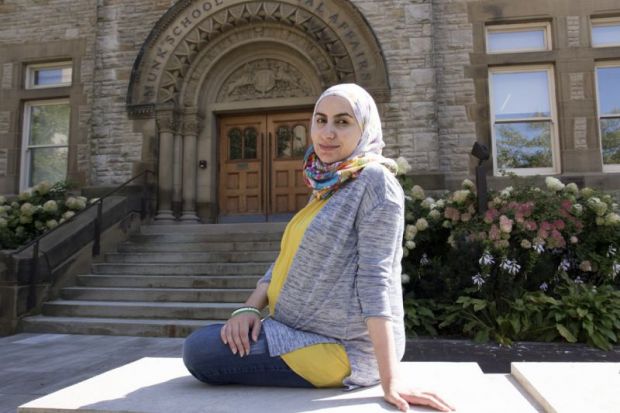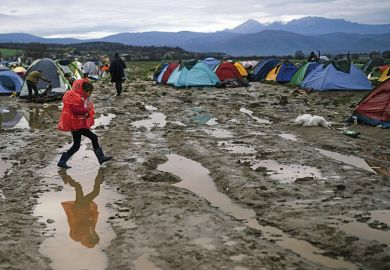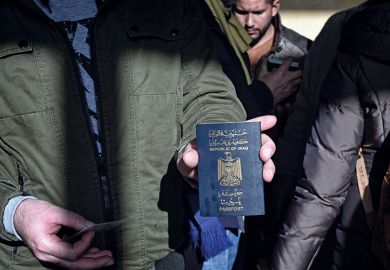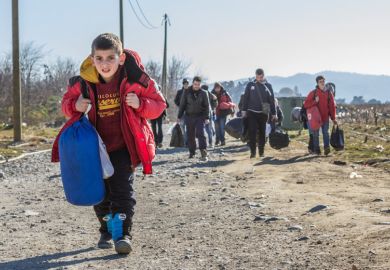Noura Al-Jizawi first became a political activist while at university. But her motivation for fighting against Syrian president Bashar al-Assad’s regime relates back to when she was just six years old.
She recalls her military-style school uniform, which was khaki, “the same colour as the clothes of fighters”, and that all children had to use the same style of notebook – a small pad whose cover had a picture of Hafez al-Assad, who was then president.
She also remembers that many of her school friends “didn’t have a father”.
“After a while I recognised that their fathers were prisoners – they were detained in the 1980s, and no one knows any information about them,” Ms Al-Jizawi told Times Higher Education.
Between 1980 and 2000, the government of Hafez al-Assad “forcibly disappeared” about 17,000 individuals, according to Amnesty International, a practice that lives on under the current president.
“I remember being censored – ‘keep silent, otherwise your father will disappear as your friend’s fathers have’,” she added. “We grew up in a country of fear all the time.”
Ms Al-Jizawi, now a master’s student in global affairs at the University of Toronto, was one of the young activists who kick-started the revolution against the government six years ago.
During the early years of the revolt, Ms Al-Jizawi organised pro-democracy protests, ran a blog, posted photos of those killed by the regime and travelled around Syria, mobilising others.
She was detained several times in some of Syria’s most notorious prisons, where she was tortured with electric shocks and interrogated for 12 hours a day.
“They were trying to force me to give them more information about other activists on the ground. I wanted to keep silent and protect my friends outside,” she said. “The only thing I was focusing on was how to protect this revolution.”
Authorities also confiscated her laptop, which contained her degree certificate, and her name has now been removed from all records at her former university, she said.
Ms Al-Jizawi was released in late 2012, which she credits to an international human rights campaign, and fled to Turkey, where she launched a non-governmental organisation helping victims of torture and female survivors, and advocating for those forcibly displaced.
In 2014 she was elected vice-president of the opposition movement, one of the few female leaders in the national coalition against the regime.
“Much of my time was [spent] focusing on the negotiation to end this war and to see some justice for our people,” she said.
But she resigned from her position last year – “I felt like it was useless to continue, that a negotiation would not achieve anything" – and moved to Canada after receiving a scholarship through the University of Toronto’s Scholars at Risk programme.
She first heard about the institution when her email account came under attack two years ago. Citizen Lab, an internet watchdog group at the university’s Munk School of Global Affairs, came to her aid and published a report about a sophisticated cyberespionage campaign against the Syrian opposition.
Overall, more than 40,000 Syrian refugees have resettled in Canada since November 2015, when the government launched its #WelcomeRefugees initiative, and many universities in the country have ramped up their efforts to recruit more displaced Syrians.
Ms Al-Jizawi said that she is “trying to learn as much as I can about other countries” and the “global community” while at the Munk School.
“If I want to serve Syria well in the future, I have to know the world well,” she said. “For me and all Syrians out of Syria, we are waiting for the moment of cultural and political transition [when we will] be able to come back to Syria.”
Ms Al-Jizawi said that enrolling at Toronto has given her “new hope” and a “new life”. Although she has not yet made plans for her future, she is expecting her first child this month and wants to work on human rights issues and help make Syria a democracy once she graduates.
“When I got the admission, I felt like it was a new goal for me as a person. But also it’s a new chance for the new Syria that I’m dreaming of,” she said. “Many of us were just waiting for a chance to restart our life, to have this newborn moment.”
Register to continue
Why register?
- Registration is free and only takes a moment
- Once registered, you can read 3 articles a month
- Sign up for our newsletter
Subscribe
Or subscribe for unlimited access to:
- Unlimited access to news, views, insights & reviews
- Digital editions
- Digital access to THE’s university and college rankings analysis
Already registered or a current subscriber?








